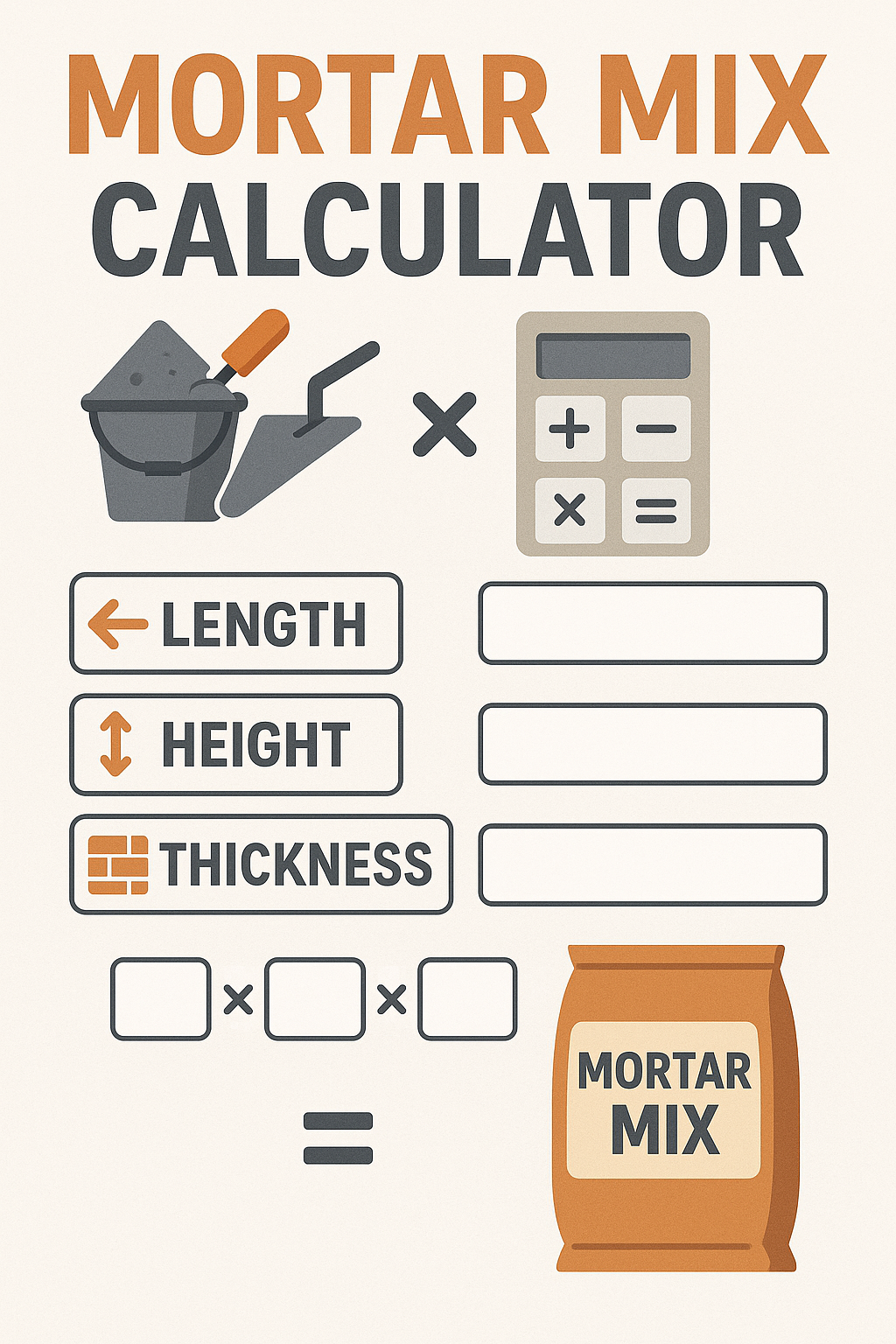Free Mortar Mix Calculator Online
Mortar is a key component in any masonry project—it binds bricks, blocks, and stones together while providing structural integrity and a clean, finished look. Whether you’re building a wall, repairing joints, or setting tiles, knowing exactly how much mortar mix to use is essential. The Construction Calculators platform features a Mortar Mix Calculator that estimates the mortar needed based on wall dimensions, joint thickness, and unit size—helping you save time, reduce waste, and manage project costs with accuracy.
This guide covers how the calculator works, key formulas, unit conversions, and real-world applications.
What Is a Mortar Mix Calculator?
A Mortar Mix Calculator estimates how much mortar is needed for a masonry project. It uses the wall area, size of the masonry units (bricks, blocks, or stones), and the thickness of mortar joints to determine the volume of mortar required. It can output results in cubic feet, cubic yards, or by number of 60 lb or 80 lb premixed mortar bags.
This tool is used by masons, builders, DIYers, and contractors to order accurate mortar quantities and reduce project delays.

Why Accurate Mortar Calculation Matters
- Avoid shortages that can stall work
- Prevent waste of excess mortar mix
- Control costs by ordering exactly what’s needed
- Improve efficiency by minimizing downtime
- Ensure consistency in batch mixing ratios
How to Use the Mortar Mix Calculator
Most calculators require the following inputs:
- Wall dimensions (height × length)
- Brick or block size
- Mortar joint thickness
- Waste allowance (usually 5–10%)
- Bag size (60 lb or 80 lb)
Step-by-Step Example
$$Wall: 20 ft long × 8 ft high = 160 sq ft$$
$$Brick size: 8″ × 2.25″ × 3.75″$$
Joint thickness: ⅜″ mortar joints
Waste factor: 10%
Step 1: Calculate Number of Bricks
$$\text{Face area of one brick including mortar: } (8.375” \times 2.625”) = 21.97 \, \text{sq in} = 0.1526 \, \text{sq ft}, \quad \frac{160}{0.1526} = 1048 \, \text{bricks}$$
Step 2: Estimate Mortar Volume Per 100 Bricks
For standard brick:
- Average mortar required = 0.30 cu ft per 100 bricks
- $$[\frac{1048}{100} \times 0.30 = 3.14 \text{ cu ft}]$$
Add 10% $$\text{Waste: } 3.14 \times 1.10 = 3.45 \, \text{cu ft}$$
Step 3: Convert Volume to Bags
- $$60\,\text{lb bag} \approx 0.45\,\text{ft}^3$$
- $$[\text{Bags} = \frac{3.45}{0.45} \approx 7.67]$$
- $$80\ \text{lb bag covers} \approx 0.6\ \text{ft}^3$$
So, for 160 sq ft of wall, you need:
- 8 bags of 60 lb mortar mix or
- 6 bags of 80 lb mortar mix
Mortar Mix Ratios
Standard mix ratios for mortar:
| Mortar Type | Mix Ratio (Cement: Lime: Sand) | Common Use |
|---|---|---|
| Type N | 1:1:6 | Exterior walls, chimneys |
| Type S | 1:0.5:4.5 | Foundations, driveways |
| Type M | 1:0.25:3 | Retaining walls, footings |
| Type O | 1:2:9 | Interior/non-load walls |
Pre-blended mortar simplifies this, as it contains all components and only requires water.
Mortar Coverage Estimations
| Unit Type | Units per 80 lb Bag | Mortar per 100 Units (cu ft) |
|---|---|---|
| Modular Brick | 36–40 bricks | 0.30 |
| Concrete Block 8x8x16 | 12–14 blocks | 0.75 |
| Thin Brick Veneer | 14–16 sq ft | 0.50 |
Use these values to estimate bag count based on surface area.
Types of Mortar for Specific Applications
| Application | Recommended Mortar Type |
|---|---|
| Interior walls | Type O |
| Exterior walls | Type N |
| Retaining walls | Type M |
| Foundations and footings | Type S or M |
| Chimneys and fireplaces | Type N or refractory |
Mortar Waste Factor
- Simple walls: Add 5% for waste
- Complex bonds or many cuts: Add 10%
- Thin veneer or irregular stone: Add 15%
Best Practices for Mixing and Using Mortar
- Use clean, potable water for mixing
- Mix thoroughly for at least 3–5 minutes
- Use within 2 hours of mixing (unless using retarders)
- Store bags in a dry, cool place
- Mix only what can be applied within the working time
Frequently Asked Questions
How much mortar do I need per 1000 bricks?
Standard:
- ~3 cubic feet of mortar
- About 8–9 bags (80 lb) or 12–13 bags (60 lb)
Can I mix mortar by hand?
Yes, for small jobs. Use a mixing tub and hoe or shovel. For large jobs, use a mortar mixer.
What happens if I use too much water?
Excess water weakens mortar and can lead to cracking or crumbling once cured.
Can I reuse mortar that has dried in the pan?
No. Once mortar begins to set, it should not be re-tempered or rehydrated.
Related Construction Calculators
- Brick Calculator – Estimate the number of bricks required
- Block Calculator – For concrete masonry units
- Sand Calculator – Estimate sand needed for mixing
- Concrete Volume Calculator – For slab and footing calculations
- Gravel Calculator – For underlayment or drainage
Conclusion
The Mortar Mix Calculator simplifies masonry planning by estimating how much mortar you need based on wall size, unit dimensions, and joint thickness. It helps reduce waste, manage material costs, and keep your project on schedule. Found on the Concrete Calculators platform, this tool works seamlessly with others like the Epoxy Calculator for coating applications and the Paver Calculator for outdoor surfacing—making your entire construction workflow more accurate, efficient, and cost-effective.
